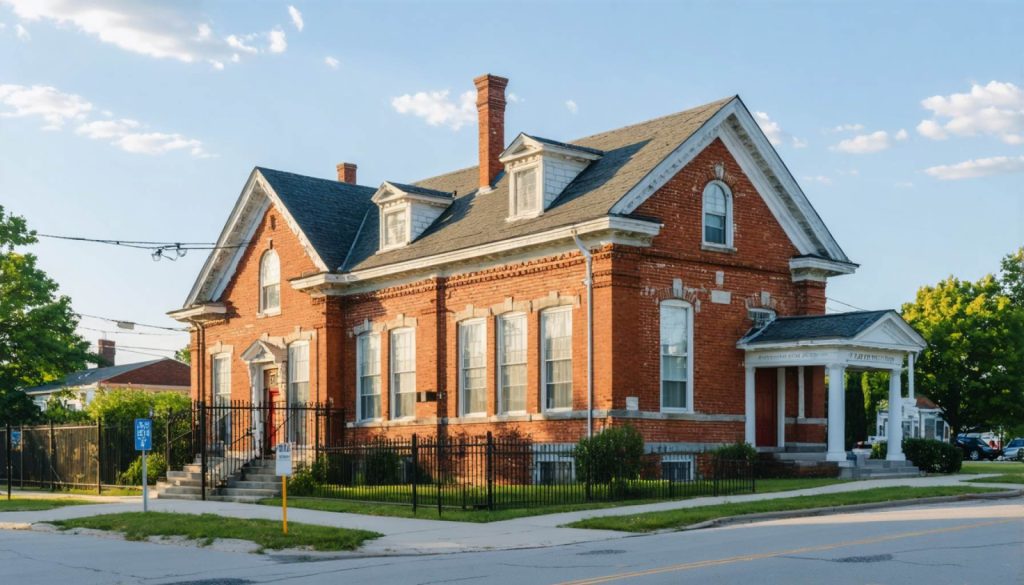
- A historic schoolhouse in Springfield, Vermont, is undergoing a $7.2 million transformation by the Black River Innovation Campus (BRIC) to become a tech-driven entrepreneurial hub.
- The renovation maintains the iconic architecture while updating systems and adding accessibility, aiming to foster a vibrant business ecosystem.
- BRIC plans to integrate community spaces, such as a gymnasium and a theater, along with 23 market-rate apartments for entrepreneurs.
- The project faces financial challenges due to high construction costs, particularly concerning the housing development aspect.
- BRIC offers an Actuator program, an eight-week accelerator to support aspiring entrepreneurs, and partners with Google for skill-building in cybersecurity and design.
- STEAM initiatives supported by local philanthropy introduce students to robotics, nurturing future tech leaders.
- BRIC’s sister initiative, Cultivator, expands entrepreneurial growth with educational support in Randolph.
- BRIC envisions Vermont as a thriving center for creativity, cooperation, and innovation.
A grand transformation is underway in Springfield, Vermont, where the historic Park Street schoolhouse is poised to become a beacon for budding entrepreneurs. The Black River Innovation Campus (BRIC), nestled in the heart of Springfield, is driving this ambitious $7.2 million renovation project, reflecting a profound commitment to fostering a thriving business ecosystem in this quaint town.
The Park Street schoolhouse, built in 1895 and renowned for its stately architecture, is more than just a relic of the past. BRIC envisages this iconic structure as a dynamic incubator for technology-driven enterprises, while retaining its architectural charm. As the renovation masterminds work diligently, the aged walls of the schoolhouse are shedding their historic ivy for a modern facelift—complete with state-of-the-art electrical systems, fire suppression adaptations, and crucial accessibility upgrades.
But the makeover is more than skin-deep. BRIC’s vision extends beyond aesthetics, eyeing the school’s gymnasium and its grand 500-seat theater as vibrant community hubs. Envision the acoustic magic of a bustling theater where voices resonate to the balcony—a nod to the schoolhouse’s storied past.
In an unexpected twist, BRIC plans to weave residential elegance into this industrious tapestry. The intent is clear: transform part of the space into 23 market-rate apartments catered to entrepreneurs, creating a seamless blend of live, work, and innovate. Yet, challenges loom large on the horizon. Making housing development financially viable in Vermont poses a sizable hurdle amid high construction costs and modest returns.
As BRIC Executive Director Vin Fusca reflects on this quest, he underscores Vermont’s compelling allure. It’s a state where community roots run deep, and the ethos of shared success drives innovation. Entrepreneurs who step into BRIC’s fold are equipped not just with business acumen but with a sensitivity towards community impact—crafting enterprises with heart and purpose.
BRIC’s hallmark Actuator program embodies this philosophy. This eight-week crash course empowers visionaries to transform nascent ideas into tangible businesses, drawing participants from cultural bastions like Boston and New York City. The results are clear, with past cohorts exploring ventures in software, gaming, and niche food production.
Extending its reach, BRIC partners with technological titans like Google to offer vital skill-building certifications across domains like cybersecurity and UI/UX design—ensuring Vermont’s labor force remains competitive in the digital age.
Beyond fostering entrepreneurs, BRIC is nurturing the next generation of innovators through STEAM (science, technology, engineering, arts, and math) initiatives. This drive, fortified by local philanthropy, equips schools with tools like Lego Robotics, laying the groundwork for future tech-savvy leaders.
The ripples of BRIC’s influence extend to Randolph, where its sister initiative, Cultivator, is burgeoning. This program aims to germinate entrepreneurial vibes, backed by robust educational frameworks and the collective wisdom of the region’s economic development leaders.
With optimism coursing through their veins, BRIC’s team heralds a mighty Vermont—a nexus of creativity, cooperation, and potential. For those eyeing a collaborative, business-friendly environment, the message is undeniable: Springfield is ready to reimagine the future.
The Future of Entrepreneurship in Vermont: Springfield’s Park Street Schoolhouse Transformation
Unveiling the New Springfield: How a Historic Schoolhouse is Powering Vermont’s Future
The transformation of the Park Street schoolhouse in Springfield, Vermont, goes beyond a mere facelift; it signals a revolution in entrepreneurial spirit and community innovation. The Black River Innovation Campus (BRIC) is at the forefront of this $7.2 million project, which blends the town’s rich historical heritage with the cutting-edge needs of modern entrepreneurs. Here’s what you need to know about this bold initiative and its far-reaching implications.
Key Features of the Transformation
1. Technological Advancements: The renovation includes state-of-the-art electrical systems and fire suppression adaptations to ensure the building meets modern safety and operational standards.
2. Community Spaces: The renovation will see the school’s gymnasium and 500-seat theater revitalized as community hubs, potentially hosting events, workshops, and performances.
3. Entrepreneurial Housing: The plan to create 23 market-rate apartments aims to provide a live-work environment for budding entrepreneurs, although financial viability remains a challenge due to high construction costs.
4. Educational Opportunities: BRIC partners with companies like Google to offer certifications in critical areas like cybersecurity and UI/UX design. Additionally, BRIC promotes STEAM education through local initiatives such as Lego Robotics programs in schools.
Real-World Use Cases
– Tech Startups: Budding tech entrepreneurs can use the space to collaborate, innovate, and grow their startups, leveraging BRIC’s resources and networks.
– Community Engagement: Community groups and artists can utilize the refurbished theater and gymnasium for local events, helping to foster a sense of community.
– Skill Development: Individuals seeking to upgrade their skills can participate in BRIC’s programs, benefiting from certifications that enhance employability in digital fields.
Market Forecasts & Industry Trends
– Rising Interest in Entrepreneurial Ecosystems: As remote work becomes more prevalent, the demand for live-work spaces like the Park Street schoolhouse is expected to increase, particularly in picturesque, culturally rich areas like Vermont.
– Growth in STEAM Education: There is a global push towards integrating STEAM education in early learning, and BRIC’s initiatives align well with this trend, potentially boosting Springfield’s attractiveness as a tech hub.
Controversies & Limitations
– Financial Hurdles: Developing affordable yet profitable housing remains a significant challenge in Vermont, potentially impacting the project’s completion timeline.
– Preservation vs. Modernization: Successfully balancing the preservation of the building’s historic aspects with the need for modern amenities will require careful planning and execution.
Pros & Cons Overview
Pros:
– Enhances Springfield’s status as a business-friendly location.
– Provides much-needed community and collaborative spaces.
– Promotes technological and entrepreneurial education.
Cons:
– High construction costs might limit housing availability.
– Balancing historical preservation with modernization can be difficult.
Actionable Recommendations
– For Entrepreneurs: Consider Springfield as a viable location for starting or relocating your business, given the blend of resources, community support, and affordable living.
– For Educators and Schools: Explore partnerships with BRIC to enhance STEAM programs and provide students with early exposure to tech skills.
– For Investors and Developers: Engage with projects like BRIC to address Vermont’s housing challenges while contributing to its entrepreneurial ecosystem.
To learn more about the innovative initiatives and opportunities in Vermont, visit BRIC’s official website.



